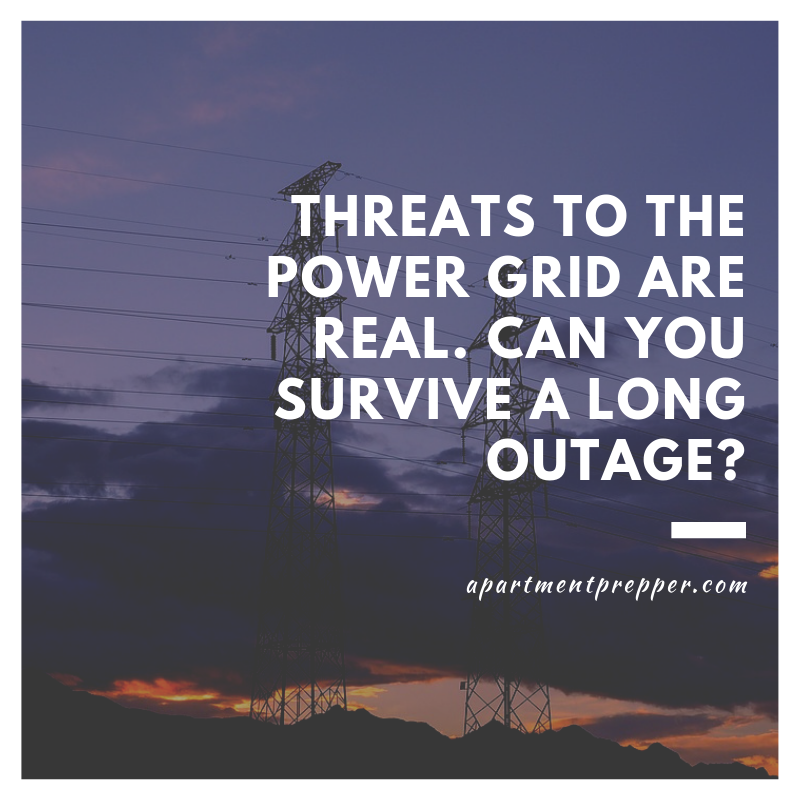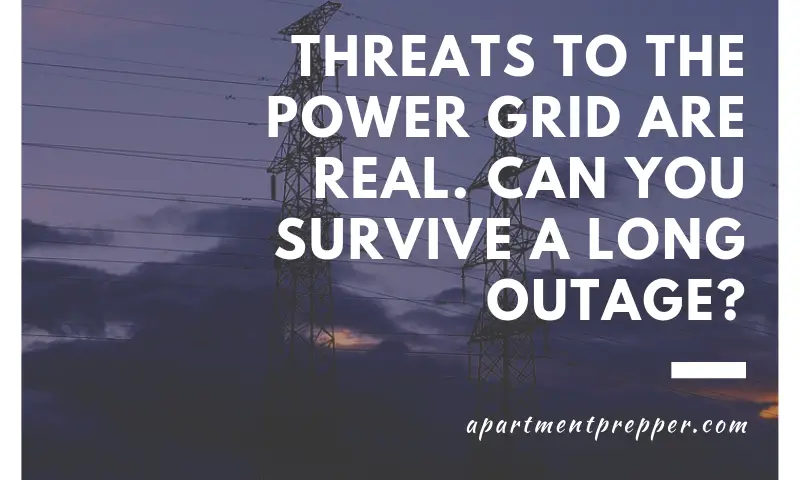This post is by Bernie Carr, apartmentprepper.com
You may have heard about that large scale power grid failure in three countries Argentina, Paraguay, and Uruguay last week. Around 48 million people lost electricity. While the incident was blamed on design flaws of their interconnected power grid, the real cause is still under investigation.
Can it happen here?
We already know major disasters can cause extended power outages in regional areas. Hurricane Sandy caused 48 million to lose power. It took 18 months for power to be fully restored to Puerto Rico after Hurricane Maria destroyed their underwater cables.
In addition to natural disasters, there are also man made threats such as cyber attacks. A couple of years ago, I read Lights Out by Ted Koppel. It tells of the threats to the U.S. power grid such as the aforementioned cyber threats, the danger of an EMP (electromagnetic pulse), and the difficulties of getting repairs done should a large scale power grid failure occur.
The government does take these threats seriously and even the FBI has warned about the risks to the power grid.
What happens in a large scale power grid failure?
Transportation
Think about what happens when stop lights stop working all at once. It could take hours just to go a few blocks during rush hour. Public transportation such as trains may stop running and you may have trouble just getting home from work.
Gas pumps may stop working.
Purchases
I was once in a supermarket when electricity went out. The store manager announced they were closing all the checkout registers, except for one: the cash only register. When power goes out, most stores cannot process credit or debit transactions.
If cell towers keep working you may be able to pay using cell phone apps if you have the vendor’s app downloaded to your phone or tablet.
Employment
I was at work when the downtown area lost power in the middle of summer. There were generators for lighting but the elevators stopped running and the building quickly got very warm.
If power is out and internet is down, and you rely on these connections for work, you may not be able to earn money.
Water
Water companies rely on electricity for water treatment. The water from the tap will become unsafe to drink
Nuclear power
Nuclear power plants need electricity to cool their reactors. U.S. nuclear power plants are required to have backup systems to deal with power outages, but there is always a risk of lack of failure. We can still recall the disaster from Fukushima after the earthquake and tsunami in Japan back in 2011.
Health
Lack of electricity would be a major problem for anyone relying on medical devices that require power such as breathing machines, dialysis, infusion pumps, etc. Diabetics who use insulin need refrigeration so they are at risk as well.
What you should do
Get prepared for a power outage. It does take a large disaster to lose power. We sometimes lose power due to extreme heat, when the power grid is overburdened.
1. Have at least two weeks or more worth of water, food, first aid and supplies. In case it’s not safe or feasible to go out, have an emergency power outage kit including plenty of water, food, lighting, a way to cook food, disposable plates and utensils, trash bags, first aid, your prescription medicines, personal care and activities to occupy your time.
2. You need a way to deal with waste – You’ll need a makeshift toilet, lots of heavy duty trash bags, cat litter, baking soda and bleach.
3. Don’t neglect fire safety Apartment dwellers are vulnerable to fire, due to proximity between units.
4. Have a way to defend yourself – Without power, security doors and alarms will fail. Find a way to make your apartment doors and windows more secure.
Know what weapons you can use and how they work.
5. Find your escape routes – Figure out how to get home in an emergency. You need to know every entrance and exit to your building so you have an escape route out of your building.
If you live within 50 miles of a nuclear power plant, you may need to evacuate if there is a nuclear disaster. You’ll need to plan your evacuation route as well. Stock up on potassium iodide pills for thyroid protection in the event of a nuclear emergency.
6. Communication One of the things I fear about a long term blackout: losing contact with loved ones. With no phones or computers working, you have no way to contact each other. Before anything happens, designate a meeting place in an emergency. Have backup communications, such as ham radio, two way radios.
7. Your everyday carry – Start carrying items you can use in an emergency – Swiss army knife, paracord bracelet, LED flashlight etc.
8. Learn about food preservation. – Learn to dehydrate foods (even without a food dehydrator), preserve eggs, as well as what foods can last without a fridge.
9. Emergency cash – Without debit and credit transactions, cash is king. Keep a cash stash in a safe place.
10. Check your power outage supplies. If someone in your family is reliant on power for health reasons, get a generator if possible. You may also want to consider a portable refrigerator that can keep essential items cold. Solar garden lights can be left out all day and provide lighting indoors at night. Replace old batteries, get a solar charger, and portable power charges.
These are just beginning tips on preparing for a long term power outage. Ideally, we’d all have a bug out retreat that we can get to but not everyone has one. We all have to start somewhere and we can only to our best to prepare in our own circumstances.
If you found value in the article, please help us keep this site free by supporting Apartment Prepper on Patreon. Click here: https://www.patreon.com/apartmentprepper No worries if you are not able to, I’ll still keep writing!

About the author:
Bernie Carr is the founder of Apartment Prepper. She has written several books including the best-selling Prepper’s Pocket Guide, Jake and Miller’s Big Adventure, The Penny-Pinching Prepper and How to Prepare for Most Emergencies on a $50 a Month Budget. Her work appears in sites such as the Allstate Blog and Clark.com, as well as print magazines such as Backwoods Survival Guide and Prepper Survival Guide. She has been featured in national publications such as Fox Business and Popular Mechanics. Learn more about Bernie here.
Image by Foundry Co from Pixabay


I like to store foods that I can eat with out needing to be cooked. Canned food and meal packs. This includes instant oat meal, Ramen noodles both of witch can be eaten dry. With the Ramen noodles you will not be using the flavor pack. I have 35 gal of water stored in different containers. I also have a small propane camp stove. I live on the 3rd floor of my building so I will not have to bad of a time getting up and down the stairs. You will also have the worry about you neighbor’s when they supplies become short if they have any at all. You will not want to show lights at night because this will make a target. And remember just how far cooking smells can carry. That is why being able to have foods stored that do not require cooking can be so important. Be carful of the trash you throw out as this my give away that you have supplies. You will not be able to fill you cars gas tank and you may find that you gas is stolen right out of your car. Good reason for locking gas cap. And you may want to have you own siphon hose (I like clear plastic gasoline hose for this) and gas can. Because you may need to siphon gas out of other cars.
Geo, These are all great suggestions. Trash does give clues on what you have stored up, and having a gas cap is also important to protect what you have. Thanks for the comment!
Grid down is a significant possibility. But, just a as bad, and more likely, is the credit/banking interconnection system shutdown. How long can you go without accessing cash, or credit? How long can your gas station go without credit card business? Grid down is an issue to be considered. But, there are several others infrastructure systems that will have the same impact; albeit, over a week or two longer period of time.
MKS, I agree, the banking/credit system is also at risk and should be something to prepare for. That’s why it’s so important to have cash and supplies. Thanks for the comment!
We have fifty fire trucks and ambulances in our fleet. We have 3 days diesel fuel in surface tank storage. We will burn through that in 48 hours in a city wide emergency. After that, without resupply, we are dead in the water. Emphasis on first aid supplies and anything you can use for fire suppression. Make sure you have enough garden hose to reach every square inch of your property. It will be inadequate, but better than nothing.
Shakespear, That is a good addition-a hose to protect from fire. Thanks for the comment!
Don’t forget manual can openers. No sense having canned goods and not being able to get at them. And, if you have a way to heat water, a French press coffeemaker can be a godsend. Gotta have my java in the morning.
Hi SuzyGee, I’m with you – really need the coffee in the morning! We used the French Press during the last hurricane. Can opener is a necessity as well. Thanks for the comment!
Having a can opener is one of the reasons I carry a US GI pocket knife. Even though I have found that several people could not figure out how to use it. I also have several P38 openers as well as several regular manual openers